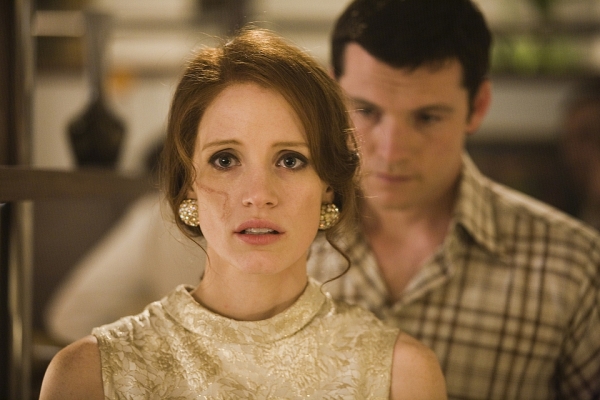Movie review by Greg Carlson
Based on a 2007 Israeli movie with the same title, John Madden’s remake of “The Debt” dramatizes Cold War-era Nazi hunting in East Berlin and a cloudy love triangle involving the Mossad agents sent to capture a villain known as the Surgeon of Birkenau. Cutting between the 1965 kidnapping assignment and 1997 events commemorating the presumably heroic actions of the operatives, “The Debt” pivots on a major plot twist linking past and present. Despite the movie’s underutilization of Helen Mirren, Ciaran Hinds, and Tom Wilkinson, “The Debt” manages to revisit a number of long-echoing questions of good, evil, and human nature raised by the grim events of the Holocaust.
The moviemaking technique employing two sets of actors to embody characters who have aged across decades requires a nimble director, a competent editor, and a group of performers committed to developing some sense of consistency. In “The Debt,” both Jessica Chastain and Mirren play Rachel Singer, an intensely dedicated government agent who endures a series of grim tests of psychological commitment to a presumably greater cause. “The Debt” implies that Singer’s selection to the East Berlin team hinged on her gender and her willingness to pose as a pregnancy-minded young patient to infiltrate the clinic run by Nazi-in-hiding Dieter Vogel (Jesper Christensen).
Singer’s devotion to Israel and the pursuit of justice places her in an unenviable position of incredible vulnerability, as the undercover officer tolerates a series of vaginal exams given by the target of the undertaking. The potentially exploitative circumstances of the unorthodox methods used on the assignment are rife with subtext pairing Singer’s risk of identity exposure to the literal uncovering of her body. That Vogel once participated in medical atrocities committed against Jews but later assumed the role of life-affirming obstetrics and gynecology professional adds another layer of complexity to the proceedings.
Madden squeezes a maximum of squirm-inducing tension from the exam room scenes, and Singer’s relationship to Vogel develops with greater specificity than the muddier romantic feelings she expresses toward her fellow team members. That Rachel Singer’s point of view is privileged and centralized in a genre heavily oriented toward masculinity distinguishes “The Debt” from the majority of its peers, but the staging of several physical altercations involving Singer (including a locked-thighs choke-out evocative of vagina dentata) strongly suggests that any consideration of gender issues will favor action over introspection.
Madden bookends the film with the more recent storyline, placing the 1965 caper at the heart of the narrative in a whopping flashback triggered by the release of a non-fiction account of the episode written by Rachel’s daughter three decades later. Despite the 1997 Rachel’s desire to protect her daughter’s reputation, “The Debt” somewhat inexplicably steers clear of some much-needed exploration of the consequences of the political conspiracy that has remained a secret for so long. Mirren and Wilkinson play a few small scenes that hint at a finer account of long-bottled guilt, remorse, and frustration, but the last act of “The Debt” depends on a wildly improbable scenario that sends Rachel into a creepy sanitarium on one final do-or-die mission.
